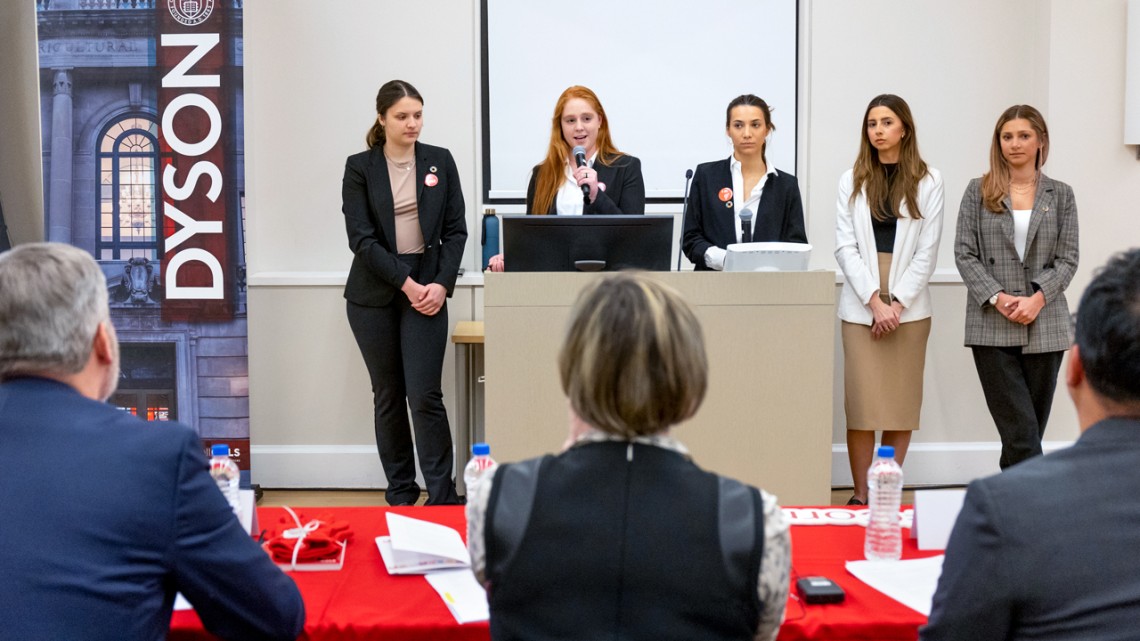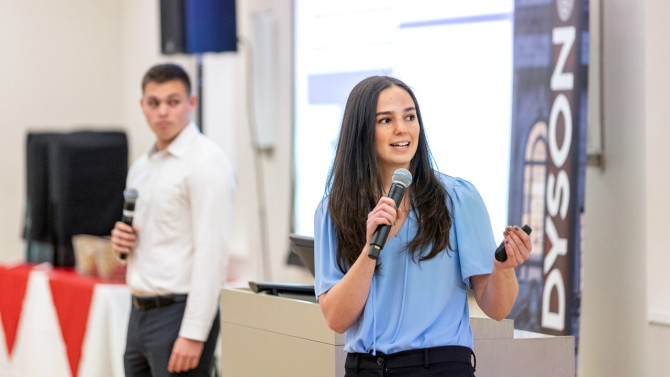
Team naRoho, from left: Emily Battey, Nicole Shulman, Elana Zingas, Helena Zimmerman and Morganne Farinha present at the inaugural Grand Challenges Pitch Competition.
Dyson students tackle societal issues at competition
By Jay Wrolstad
Students working to support local Indigenous heritage, dairy farmers, formerly incarcerated people and entrepreneurs in Uganda and Ithaca competed for a total of $7,500 in prize money that will fund their community collaborators.
Team Canoe Fest, which aims to help local Indigenous people reconnect with their ancestral waterways and heritage on their traditional lands, took top honors March 9 at the inaugural Grand Challenges Pitch Competition, sponsored by the Charles H. Dyson School of Applied Economics and Management. The Canoe Fest team finished first among five student groups, earning $2,500 of the $7,500 total in prize money.
Each team used their business and consulting skills to work with a project sponsor and make a meaningful impact on societal issues affecting communities locally, regionally, nationally and abroad as part of a capstone project in the Grand Challenges Program – a series of classes that align with the priorities of the United Nations Sustainable Development Goals. The prize money went to the community organizations the students supported.
The pitch competition was the culminating event of Dyson’s Better Business Week, hosted by the Dyson Undergraduate Council.
“We are building a 16-foot-long cedar canoe using blueprints originally designed by Indigenous peoples of the Northeast,” said team member Sarah Rubin ’23. Team Canoe Fest members, who are enrolled in a Grand Challenges canoe-building class taught by Trent Preszler, visiting professor of practice at the Dyson School, also put together a short video to apply for the pitch competition.
Judges cited Team Canoe Fest for its “striking presentation,” noting that the proposal identified a clear need in an underserved population while strengthening ties between the local population and the Indigenous community.
The team will launch its canoe on May 7 in Ithaca as part of the inaugural Ithaca Canoe Fest, a community-sponsored event. “We are here to seek funding to make Canoe Fest an inclusive and unifying event for all,” Rubin said. “Our top priority is ensuring that we can subsidize attendance, cover event costs and make the event accessible across Ithaca’s diverse communities.” To help meet this goal, the students’ canoe will be given to Haudenosaunee Canoe Journey, which guides Onondaga Nation youth on a 13-day summertime journey to rediscover their ancestral waterways.
The pitch competition celebrates project teams and their sponsors and offers students a chance to demonstrate their professional skills, said Lisa Gerber, Grand Challenges program manager. “They are helping communities large and small, and they are seeing the impact that they can have as future business leaders,” she said. The Grand Challenges curriculum is required for all Dyson undergraduates, she noted, and 21 project teams applied to present at the pitch competition in its inaugural year.
Team Second Wind Cottages earned second place and $1,750 for its plans to support a local housing development for men recently released from incarceration. The team will use the money to establish a food pantry for the community of 18 men.
Third place went to Team naRoho, supporting a woman-run business startup in Uganda that is part of Soft Landing New York and that sells hand-crafted leather goods worldwide.
Team Youth Entrepreneurship Markets (YEM), which aims to improve operations and outreach for a local organization that works with budding young businesspeople, earned fourth place and $1,250.
Fifth place and $500 was awarded to Team Dairy Farmers of America, supporting a large U.S. cooperative that serves and protects family farms.
The students had assistance in preparing their presentations. Entrepreneur Steven Izen ’13, Dyson’s Dean’s Distinguished Lecturer, served as a pitch coach and mentor for the five finalists, helping the students hone their presentations. Project teams were also coached and mentored by students in the Samuel Curtis Johnson Graduate School of Management as part of a collaborative effort with Johnson Leadership Programs.
The judges were Linda Barrington, associate dean, strategy and societal impact, SC Johnson; Alan Martinez, senior manager, strategic partnerships at the Cornell Atkinson Center for Sustainability; and Gregory Hartz ’83, president of Tompkins Community Bank CNY and executive vice president of Tompkins Financial.
Jinhua Zhao, the David J. Nolan Dean at Dyson and professor of applied economics and policy, described the event as a journey shared by all the Grand Challenges teams, faculty and sponsors.
“This is about applying your knowledge and gaining knowledge through the process. It’s also about teamwork and working collaboratively toward a shared goal,” he said. “As Dyson students you are building more connections to different parts of the community, and the world.”
Jay Wrolstad is a freelance writer for the Cornell SC Johnson College of Business.
Media Contact
Adam Allington
Get Cornell news delivered right to your inbox.
Subscribe

